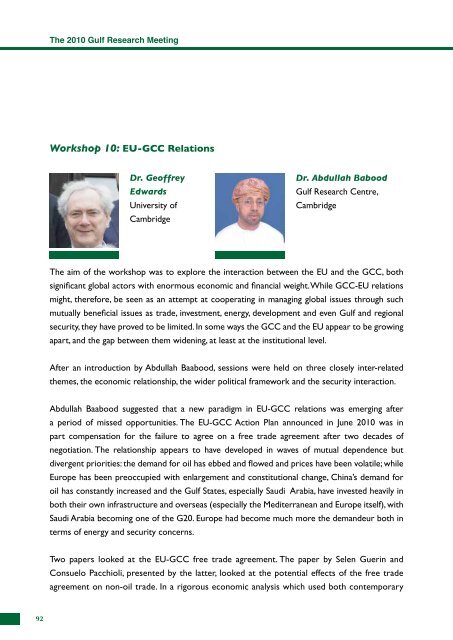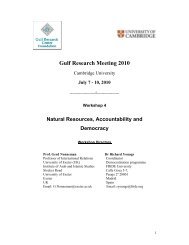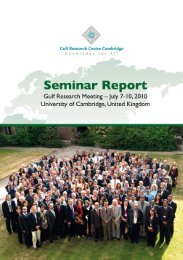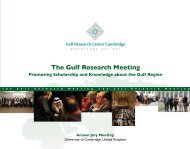GRM 2010 Report - Centre of Islamic Studies - University of ...
GRM 2010 Report - Centre of Islamic Studies - University of ...
GRM 2010 Report - Centre of Islamic Studies - University of ...
You also want an ePaper? Increase the reach of your titles
YUMPU automatically turns print PDFs into web optimized ePapers that Google loves.
92<br />
The <strong>2010</strong> Gulf Research Meeting<br />
Workshop 10: EU-GCC Relations<br />
Dr. Ge<strong>of</strong>frey<br />
Edwards<br />
<strong>University</strong> <strong>of</strong><br />
Cambridge<br />
Dr. Abdullah Babood<br />
Gulf Research <strong>Centre</strong>,<br />
Cambridge<br />
The aim <strong>of</strong> the workshop was to explore the interaction between the EU and the GCC, both<br />
significant global actors with enormous economic and financial weight. While GCC-EU relations<br />
might, therefore, be seen as an attempt at cooperating in managing global issues through such<br />
mutually beneficial issues as trade, investment, energy, development and even Gulf and regional<br />
security, they have proved to be limited. In some ways the GCC and the EU appear to be growing<br />
apart, and the gap between them widening, at least at the institutional level.<br />
After an introduction by Abdullah Baabood, sessions were held on three closely inter-related<br />
themes, the economic relationship, the wider political framework and the security interaction.<br />
Abdullah Baabood suggested that a new paradigm in EU-GCC relations was emerging after<br />
a period <strong>of</strong> missed opportunities. The EU-GCC Action Plan announced in June <strong>2010</strong> was in<br />
part compensation for the failure to agree on a free trade agreement after two decades <strong>of</strong><br />
negotiation. The relationship appears to have developed in waves <strong>of</strong> mutual dependence but<br />
divergent priorities: the demand for oil has ebbed and flowed and prices have been volatile; while<br />
Europe has been preoccupied with enlargement and constitutional change, China’s demand for<br />
oil has constantly increased and the Gulf States, especially Saudi Arabia, have invested heavily in<br />
both their own infrastructure and overseas (especially the Mediterranean and Europe itself), with<br />
Saudi Arabia becoming one <strong>of</strong> the G20. Europe had become much more the demandeur both in<br />
terms <strong>of</strong> energy and security concerns.<br />
Two papers looked at the EU-GCC free trade agreement. The paper by Selen Guerin and<br />
Consuelo Pacchioli, presented by the latter, looked at the potential effects <strong>of</strong> the free trade<br />
agreement on non-oil trade. In a rigorous economic analysis which used both contemporary





